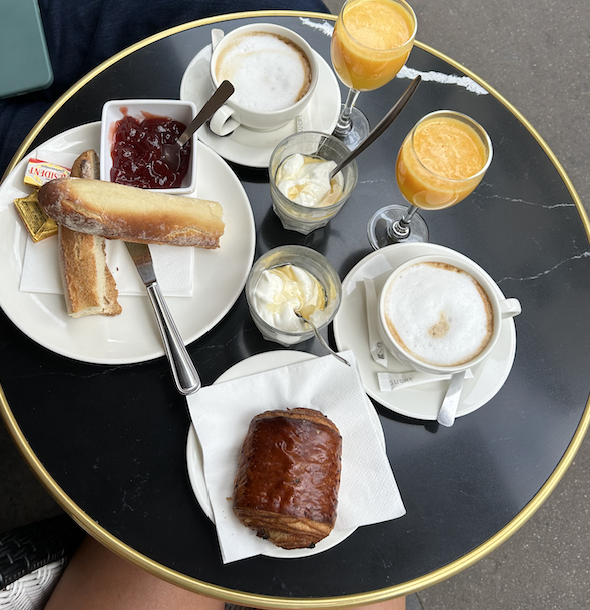As the first semester of my academic year abroad in Paris comes to a close, I have often been asked about the cultural shocks I've experienced and what I miss about the United States. While it would be easy to list off instances where I've felt belittled, uncomfortable, or unnerved in the face of culture shock over these past few months, it would be unfair to characterize all of my experiences with the unnavigated crevices of Parisian culture as negative. There is no doubt that Paris sometimes lacks the outward kindness or the exquisite customer service Americans are known for, but as I gradually adapted to my new home, I began to discover several cultural differences that made me rethink the American way of life. One of these differences is the heavy emphasis placed on mealtime. While this seems like a trivial distinction between French culture and that of the United States, the significance of mealtime runs much deeper than the food itself.
In the United States, it seems as if we only eat to live. In the morning, we grab a granola bar as we rush out the door to work or school. At lunchtime, workers scarf down last night's leftovers alone at their desks, constrained by a 30-minute time limit. Students eat quickly between classes, usually with their heads buried in their laptops. When we do have the opportunity to share a meal at a restaurant, whether it be a special occasion or not, efficiency is prioritized over enjoyment. Many restaurants restrict reservations to two-hour time limits, with waiters not-so-subtly dropping off the check the minute your plate is cleared.
In France, however, mealtime is practically sacred, and no special occasion is needed for a hearty meal among friends, colleagues, or family. Strolling through the streets of Paris between noon and three o'clock is evidence of this: the restaurant terraces are packed with men in suits and women in blazers who leisurely pick at their plates as they chat. There is no rush to finish, and some colleagues even share a meal over a bottle of wine. Restaurants value the enjoyment of their patrons over the number of customers they are able to serve; there are no time limits on reservations or a hurry to turn over tables. As Americans eat to live, the French live to eat. The importance of mealtime in France has significantly shaped my study abroad experience: my favorite way to explore Paris and its melting pot of cultures is through my taste buds. Sharing good conversation in "hidden gem" establishments and cooking cultural dishes in my communal kitchen have also been avenues through which I've grown closer to the people I've met while abroad.
It should be clear by now that the significance of mealtime is not just about food. Instead, it offers insight into the many aspects of French culture that differ drastically from that of the United States. It reflects the value that the French put on work-life balance, a balance that American firms often fail to provide. It demonstrates the importance of spending time with loved ones outside of special occasions and the value of being part of a community at work or school, an idea that the strong American values of individualism and self-reliance sometimes overshadow. And it shows that one should sometimes take a moment to sit down, relax, and enjoy themselves, a practice that seems to be disappearing in today's fast-paced consumerist society.
Justine Recor
Academic Year 2023
GW Paris - Sciences Po Paris (GW Study Program)
Elliott School of International Affairs
International Affairs Major



